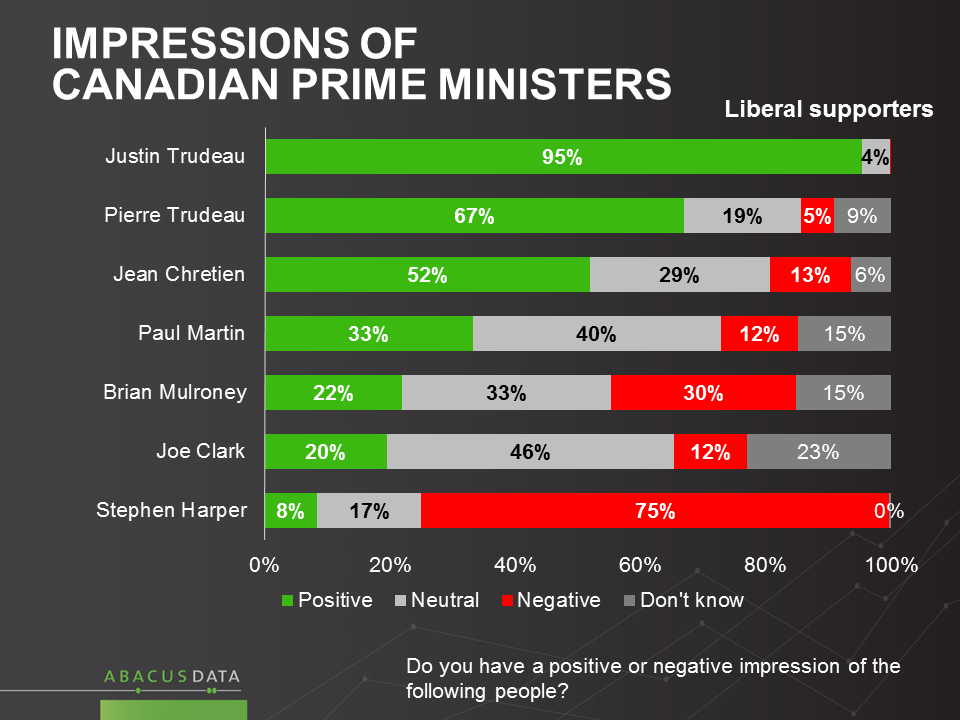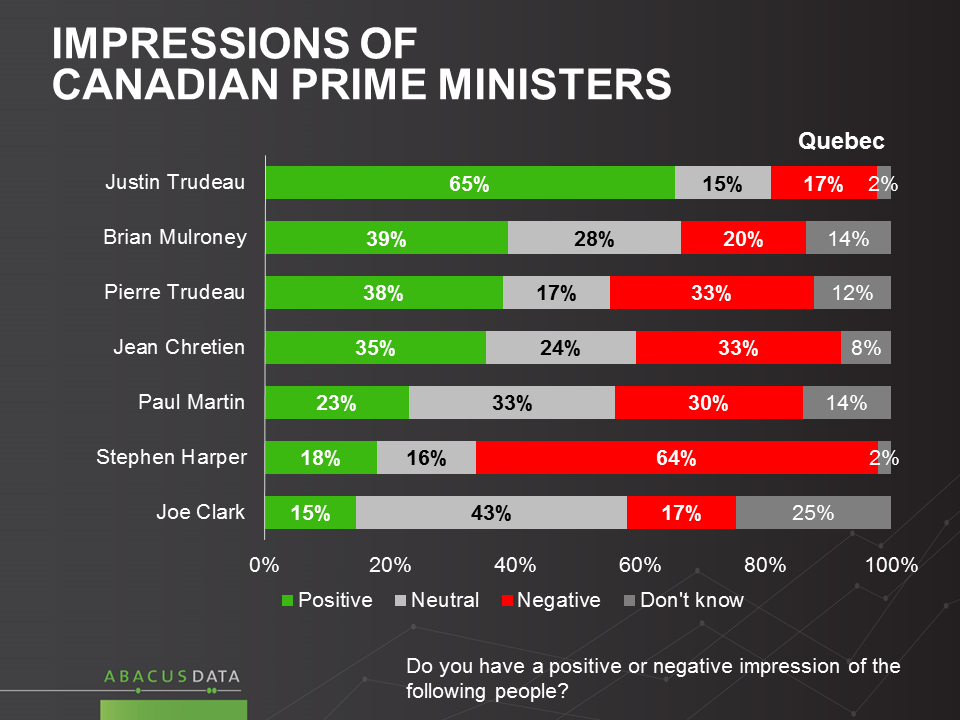Popularity & Prime Ministers
January 17, 2016
Highest positives for Trudeau son & father
Highest negatives for Stephen Harper

In our latest poll we asked how people felt about the last 7 people who won elections and became prime minster. The results provide some context in which to assess feelings about the two most recent election winners, Justin Trudeau and Stephen Harper, and also tell us something about how reputations might shift with the passage of time and how partisanship affects our views of prime ministers.

Here are the points that most caught our attention:
• Of all 7 tested, Justin Trudeau is easily the most popular, followed by his father, Pierre Trudeau. Justin Trudeau is not only the most popular of these men among Liberal voters (95% have a good view of him), he’s also the most popular among NDP voters (49% positive – 24% negative). Among Conservative voters, he’s easily the most disliked with 69% saying they have a negative view of him. Conservatives don’t like his father that much, either but are less hostile to Paul Martin or Jean Chretien.
• Pierre Trudeau has been out of office for 30 years and his reputation has likely improved somewhat with the passage of time. Worth noting is that those under 45 give the elder Trudeau a more positive rating (+23) compared to those over 45 (+14). Also, the views of women (+21) are a bit more favourable than those of men (+16). Pierre Trudeau is the second most unpopular among Conservative supporters, disliked by just under half. Among New Democrats, Pierre Trudeau is the second most popular of the PMs tested.
• Jean Chretien’s reputation across the country is more positive (36%) than negative (25%). Among Liberals and New Democrats he’s 3rd most popular. Among Conservatives he’s not particularly disliked (26% positive, 38% negative). Views of Mr. Chretien are better among those under 45 (+17) than those older (+5).
• Views of Stephen Harper may soften somewhat with the passage of time, no doubt that is what has happened with opinions of Mr. Mulroney and Pierre Trudeau. For the moment, he has by far the highest negatives. In fact, his numbers are almost the mirror opposite of the man who beat him in October of last year.
• Mr. Harper’s numbers reflect a high degree of partisan feeling. 80% of Conservatives have a positive view of him, compared to 27% have a positive view of Brian Mulroney, and only 21% like Joe Clark. This speaks to the fact that this is in many ways a different party than the Progressive Conservative Party, more resembling the attitudes of the defunct Reform Party.
• Only 8% of Liberals like Mr. Harper, while 75% dislike him. Liberals have far less animosity towards Brian Mulroney (-8) or Joe Clark (+8)
• NDP voters show the same pattern. Reactions to Mr. Harper (-65) are far more intense than to Joe Clark (-11) or Brian Mulroney (-22).
• Stephen Harper’s ratings are negative among men (-25) but moreso among women (-32). While for much of his time in office his ratings were notably better among older people, this may have dissipated a bit. Among those under 45 Mr. Harper has a net -32; among those older than that his score is -25.
• In Quebec, Justin Trudeau is the most popular, and Stephen Harper the least so. Again, the numbers pretty much mirror each other: +48 for Trudeau and -46 for Harper. However, Pierre Trudeau falls to 3rd most popular in Quebec, after Brian Mulroney. In Quebec, Mr. Mulroney is far more liked (+19) than Mr. Harper (-46). Joe Clark also attracts far less negative opinion among Quebec voters.





The Upshot
According to Bruce Anderson: “As we know very well, popularity of politicians fluctuates over time, and how people view Stephen Harper and Justin Trudeau today maybe quite different from their views a year from now. With that caveat noted, it is compelling that these two men find their reputations almost the mirror image of each other.
It’s fascinating to note the degree to which Justin Trudeau and to a lesser degree his father are polarizing: both are popular among Liberals and New Democrats but among today’s version of the Conservative Party, the Trudeau name is like a red flag to a bull. Mr. Harper is a polarizing figure too, and the fact that he is widely disliked by NDP voters helps underscore the fact that the last election became for many voters a question of how best to get a new Prime Minister.
Finally, today’s Conservative Party supporters, (27% in this poll), feel good about Stephen Harper but show little positive feeling about Brian Mulroney or Joe Clark. This underscores one of the central challenges facing the Party, whether it needs to do more to draw in more progressive Conservatives or remain more true to the vision of Stephen Harper and reject that idea. Right now, only 43% say they would consider voting Conservative, a pool that is about 10 points smaller than the NDP and roughly 20 points smaller than the Liberals.”
Methodology
Our survey was conducted online with 1,500 Canadians aged 18 and over from January 8 to 12, 2016. A random sample of panelists was invited to complete the survey from a large representative panel of over 400,000 Canadians.
The Marketing Research and Intelligence Association policy limits statements about margins of sampling error for most online surveys. The margin of error for a comparable probability-based random sample of the same size is +/- 2.6%, 19 times out of 20. The data were weighted according to census data to ensure that the sample matched Canada’s population according to age, gender, educational attainment, and region. Totals may not add up to 100 due to rounding.
Abacus Data Inc.
We offer global research capacity with a strong focus on customer service, attention to detail and value added insight. Our team combines the experience of our Chairman Bruce Anderson, one of Canada’s leading research executives for two decades, with the energy, creativity and research expertise of CEO David Coletto, PhD. For more information, visit our website at http://www.abacusdata.ca/




